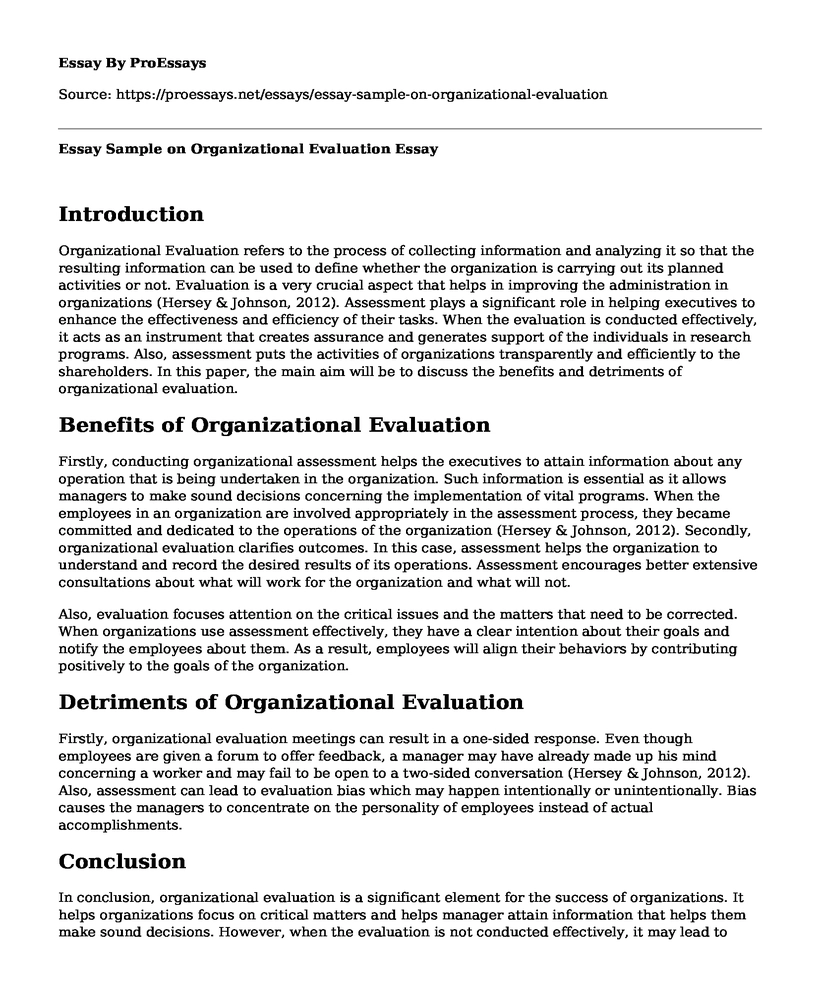Introduction
Organizational Evaluation refers to the process of collecting information and analyzing it so that the resulting information can be used to define whether the organization is carrying out its planned activities or not. Evaluation is a very crucial aspect that helps in improving the administration in organizations (Hersey & Johnson, 2012). Assessment plays a significant role in helping executives to enhance the effectiveness and efficiency of their tasks. When the evaluation is conducted effectively, it acts as an instrument that creates assurance and generates support of the individuals in research programs. Also, assessment puts the activities of organizations transparently and efficiently to the shareholders. In this paper, the main aim will be to discuss the benefits and detriments of organizational evaluation.
Benefits of Organizational Evaluation
Firstly, conducting organizational assessment helps the executives to attain information about any operation that is being undertaken in the organization. Such information is essential as it allows managers to make sound decisions concerning the implementation of vital programs. When the employees in an organization are involved appropriately in the assessment process, they became committed and dedicated to the operations of the organization (Hersey & Johnson, 2012). Secondly, organizational evaluation clarifies outcomes. In this case, assessment helps the organization to understand and record the desired results of its operations. Assessment encourages better extensive consultations about what will work for the organization and what will not.
Also, evaluation focuses attention on the critical issues and the matters that need to be corrected. When organizations use assessment effectively, they have a clear intention about their goals and notify the employees about them. As a result, employees will align their behaviors by contributing positively to the goals of the organization.
Detriments of Organizational Evaluation
Firstly, organizational evaluation meetings can result in a one-sided response. Even though employees are given a forum to offer feedback, a manager may have already made up his mind concerning a worker and may fail to be open to a two-sided conversation (Hersey & Johnson, 2012). Also, assessment can lead to evaluation bias which may happen intentionally or unintentionally. Bias causes the managers to concentrate on the personality of employees instead of actual accomplishments.
Conclusion
In conclusion, organizational evaluation is a significant element for the success of organizations. It helps organizations focus on critical matters and helps manager attain information that helps them make sound decisions. However, when the evaluation is not conducted effectively, it may lead to biases.
References
Hersey, P., & Johnson, D. E. (2012). Management of organizational behavior (Vol. 9). Upper Saddle River, NJ: Prentice Hall.
Cite this page
Essay Sample on Organizational Evaluation. (2022, Dec 05). Retrieved from https://proessays.net/essays/essay-sample-on-organizational-evaluation
If you are the original author of this essay and no longer wish to have it published on the ProEssays website, please click below to request its removal:
- Research Paper Example on Improvements in the Tourism and Hospitality Field in Morocco
- Treaty on the Functioning of the European Union - Research Paper
- Local and Global Business Opportunities for Countries Paper Example
- Comparing the Compensation of CEOs in Japan and USA Essay
- Constitutional Law and Business Regulation Essay Exaample
- Essay on Challenges Ahead for Kingston Family Vineyards in Chilean Wine Industry
- Essay Sample on Project Managers: Ethical Dilemmas & PMI Code of Ethics







